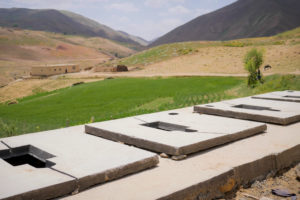It’s happening everywhere, right now. Animals eat plants. They absorb the nutrients they need. And then their waste goes into the ground and enriches the soil with all the leftover goodness. It’s simple, but effective.
So why can’t the same happen with human waste?
A composting latrine sounds like it could get a bit messy. But, in remote villages in Afghanistan’s mountains, entire communities are benefitting from these special composting latrines – and their gardens are benefitting from them too!
When IAM’s Community Development Team begins work in a new community in the Central Highlands, one of the first problems we often notice is a lack of latrines and widespread open defecation. Open defecation is a key contributing factor to the spread of many preventable illnesses. Cholera, diarrhea, dysentery and typhoid are just a few of the life-threatening illnesses that can be transmitted through poor sanitation.
By helping these communities build sanitary latrines, we can help save lives! But why stop there? Did you know that, when composted, human waste can actually increase the nutrients in soil, like animal manure does? Composted human waste creates microbial activity in the soil, increasing plants’ resistance to disease and infection, preventing erosion and increasing water retention.
In these extremely remote communities, we’re not only helping to eradicate open defecation, we are also enabling people to get the most out of their waste – reusing it in a safe and sanitary way to help increase soil fertility. For communities that rely almost solely on subsistence farming, we think that’s a pretty great thing!
How do we do it?
Our composting latrines are designed specifically for this climate and culture. In Afghanistan’s Central Highlands, winters are cold and long, which means that we need to make sure pipes don’t freeze and everything works year-round. We build each of our composting toilets with two storage tanks – one which can be in use while the other composts.
On top of each tank, there are two slabs, which separate liquid and solid waste. Liquid waste is channeled down a pipe and into a well that’s buried in the ground, so that it can be filtered and dissipate. The solids are deposited into the holding tanks, where they can decompose safely. We also have an additional hole in each slab, for a screened ventilation pipe to eliminate flies, smell, and excess moisture.

Composting latrines under construction. Here you can see the latrine slabs before the walls of the latrine are built up around them.
Access hatches to the holding tanks are sealed with concrete to make sure that the waste is safely locked away until it is fully composted – it will sit there for two years, enough time for the bad bacteria to die and for the waste to decompose into nutrient-rich material, before it is reintroduced to the soil.
All the latrines are built in partnership with the villages. Together, we make sure all the new latrines are easily accessible for the community (especially for those with less mobility), are not in the way of water flow, and are at least 20 metres from wells or springs to ensure that diseases aren’t spread.
Building latrines, strengthening communities
We don’t just give villages some latrines and walk away – we make sure the whole community is involved at every stage of the process. Without their investment, any changes we can bring to a village won’t be long-term. We train young and old (and everyone in-between) in good sanitation practices – things like using latrines and washing hands. Villagers join us in the hard manual labour of building the latrines and piping clean water from mountain springs into their villages for drinking. And we even get children involved as ‘clean police’, helping to make sure no more open defecation happens in their villages.
We believe every person should have the opportunity for a healthy life. Love for all people is one of IAM’s core values. And no human being should be getting sick and dying from preventable illness because they don’t have latrines in their villages, or because they haven’t had the opportunity to learn about good sanitation.
As communities work with us for change, we see a huge reduction in life-threatening sicknesses – which is really what our water, sanitation and hygiene work is all about. And, as the benefits of composting and reusing human waste catch on, we plan to take these latrines to more communities – keeping more people safe from disease, and helping the soil while we do it!
Think these composting latrines sound exciting?! Give now to support our work, or click here to find out about some of the other exciting things our Community Development Team are working on.